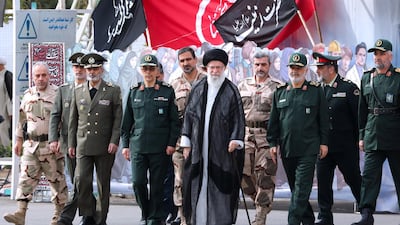The Islamic Revolutionary Guard Corps, who hold the real power in Iran, are sending dangerous messages to the world and their regional neighbours, the first of which is that dialogue with Tehran should go through them, not the president or foreign minister. If the IRGC continue to feel cornered, they could respond with military operations in the region and a power-grab at home. Next month will be crunch time, when there will be an assessment of the impact of crippling US sanctions. The IRGC plan to contain domestic resentment through foreign operations that could rally nationalist sentiment behind the regime. But before delving into this issue, it is important to assess the implications of Turkey's invasion of north-east Syria and the visit by Russian President Vladimir Putin to Saudi Arabia and the UAE.
The state visit came as the US and Turkey agreed a five-day ceasefire and the creation of a Turkish-controlled buffer zone in north-eastern Syria. These developments have left Russia anxious. Mr Putin has invited his Turkish counterpart Recep Tayyip Erdogan for a meeting in Moscow next week to clarify matters and to explain the Turkish trajectory. Mr Erdogan leaves Mr Putin with many concerns, not least because of the distrust between them, while there are implications for Russia's ambitions in finding a political solution for Syria through the Astana process. This process, which includes Russia, Turkey and Iran, is the cornerstone of Moscow's interests and strategy in Syria.
Today Russia is assessing the actions of Turkish and Iranian partners in an uncertain time. Indeed, the Russian president has firmly communicated to Iran’s leaders his opposition to operations by the IRGC in the Gulf. Mr Putin’s visit was a rare opportunity for Russia to identify how far it can make a positive breakthrough in Arab Gulf countries at all levels. During his visit to Saudi Arabia, he proposed to play the role of facilitator between the two sides. According to informed sources, Mr Putin will hold talks with Iranian President Hassan Rouhani next week to offer mediation.
Trade was also a major component in Mr Putin’s talks, both at the level of Opec co-operation and major deals. Russia’s economy is sluggish and Mr Putin needs oil prices to stabilise at about $60 per barrel to afford his grand national projects.
Russian co-operation with Gulf countries could also include technology, space and education. During the Beirut Institute Summit in Abu Dhabi last week, Russian speakers were keen to highlight the importance of Mr Putin’s visit to Saudi Arabia and the UAE, saying it sent a message to Washington that Russia’s eastward policy does not just include China but also the Middle East, and that Russia and China are co-ordinating their policies in the Middle East and the Gulf at a time of receding confidence in the US and its commitments to the security of its partners.
At the same summit, US officials who took part in the summit reported that the Trump administration has communicated its red lines to Iran: namely, that US troops in the entire region are off limits. Perhaps this is a time of weakness and desperation for the IRGC, hurting under the weight of sanctions and suffering from international isolation while being designated a terrorist organisation by Washington. It wants to be the only channel for dialogue but at the same time, continues to issue threats.
The coming month will be indicative of whether IRGC threats are serious or just a desperate attempt to take control. But what is not clear in this phase of US policy in the Middle East is what would be tolerable to the Trump administration. The question remains, too, whether the US could accept dealing with the IRGC, Iran’s deep state, rather than Mr Rouhani and foreign minister Mohammad Javad Zarif, thought to be secondary to the actual power-brokers of Tehran.
Raghida Dergham is the founder and president of the Beirut Institute


